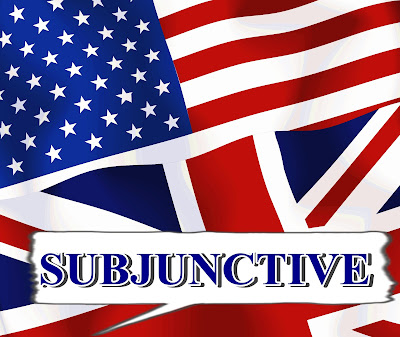
O subjuntivo na língua inglesa é a forma base do verbo, ou seja, sem nenhuma conjugação de tempo.
Usamos com verbos ou adjetivos que expressam ideia de uma ação que é necessária. Veja exemplos de verbos e adjetivos que são frequentes:
ASK
I would ask that the request for urgent debate be rejected.
Be rejected = seja rejeitado
Seja= verbo SER no subjuntivo da língua portuguesa
Be= está na forma base, sem conjugação de tempo, exercendo o papel de subjuntivo no contexto apresentado.
DEMAND
The agent is entitled to demand that he be provided with all information that is available.
INSIST
We insist that such representatives try harder.
PROPOSE
I propose that we introduce such a practice as soon as possible.
RECOMMEND
We recommend that you first telephone us.
REQUEST
They request that a resolution be voted on this regard.
SUGGEST
I suggest that a small, local working group be created, with representatives of the Colonies and the Federation.
ADVISABLE
It is advisable that experts use the lowest possible dose for treatment.
ANXIOUS
We fully support its introduction and are anxious that it be used enthusiastically.
DESIRABLE
It is desirable that the work be done within two weeks after workshop.
EAGER
We are eager that intensive dialog with the Ivorian authorities continue.
ESSENTIAL
It is absolutely essential that we make these flows of funds transparent.
IMPORTANT
It is important that the container be strong enough to withstand the forces transferred.
NECESSARY
It is necessary that provisions be made to compesate those people.
PREFERABLE
It is preferable that you use words and sentences that you have already heard.
WILLING
He was entirely willing that Abraham formulate a defensive policy for Salem.
That foi propositamente colorido para que você perceba que ele está sempre aparecendo ligando a oração que contém o verbo ou adjetivo que exprime necessidade de uma ação com a oração que tem o verbo da ação na sua forma base, ou seja, sem ser conjugado, por conseguinte, em subjuntivo.
Logo após adjetivos, se usar verbos, estes são precedidos pela preposição TO. A saber:
It is important that she eat something.
It is important to eat something.
It is necessary that we talk to him,
It is necessary to talk to him.
It is advisable that you leave her alone.
It is advisable to leave her alone.
Percebeu que o papel de THAT, portanto, é de introduzir um alguém ou um algo na oração? Enquanto TO introduz o verbo enfatizando a ação.
Diferências UK e US
O subjuntivo apresentado acima é bastante formal e é mais usado dessa maneira no inglês americano. No britânico, é mais frequentemente usado o SHOULD em vez disso, ou se usa o verbo conjugado no SIMPLE PRESENT. Veja exemplos:
UK: It is important that the container should be strong enough to withstand the forces transferred.
US: It is important that the container be strong enough to withstand the forces transferred.
UK: It is absolutely essential that he makes these flows of funds transparent.
US: It is absolutely essential that we make these flows of funds transparent.
UK: He was entirely willing that Abraham should formulate a defensive policy for Salem.
US: He was entirely willing that Abraham formulate a defensive policy for Salem.
O Subjuntivo do Passado
Existem algumas expressões que usamos para algo irreal:
- SUPPOSE
- WISH
- WOULD RATHER
- IF
- AS IF/ AS THOUGH
Depois dessas expressões podemos usar WERE ou WAS:
Suppose what you just said were/was true.
My brother looked as if he were/was drunk.
I wish my boyfriend were/was here.
Nesse modo de subjuntivo o verbo WERE pode ser também empregado na 3ª pessoa do singular. Na verdade, a norma culta da língua inglesa exige que seja usado apenas WERE, entretando, é mais comumente usado WAS e, portanto, WERE nesse caso é visto como fora de moda na língua falada no dia a dia, exceto na expressão: IF I WERE YOU (se eu fosse você), no qual nunca se troca WERE por WAS.






